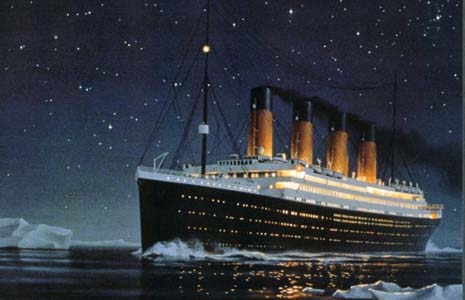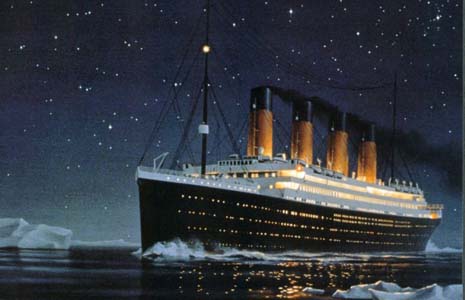 Written by Wes Annac, The Culture of Awareness
Written by Wes Annac, The Culture of Awareness
The sinking of the Titanic was one of the worst and most publicized disasters in American history, and needless to say, a lot of people lost their lives when it sank.
Those of us who know that death isn’t the end of life can take solace in the fact that those who ‘lost their lives’ are more alive than ever in another state of consciousness, but this doesn’t subtract from the devastating nature of this tragedy.
There are a lot of theories about why the Titanic sank, and some people think it was to prevent the implementation of a new financial system, which a few influential billionaires who were onboard the ship when it sank would’ve been responsible for implementing.
Politics is much dirtier than most people realize, and I could see the Titanic being sank over the greed of people who don’t want to see humanity prosper. I could write a lot about this subject, but it isn’t the focal point of this article.
Wouldn’t it be interesting to find out what the scene was like for the people who passed away on the ship? I don’t want to fill your heads and hearts with anguish, but I think it’d be very insightful to read the perspective of someone who transitioned into the fourth dimension as a result of the sinking of the Titanic.
As it turns out, there’s someone who can give us such a perspective. W.T. Stead, whose life was taken on the Titanic, apparently came back to speak through a medium about what the tragedy was like for the people who were affected by it the worst.
He’s said a lot about this subject, and we’re going to examine his words and gain a deeper glimpse into what happened and how the deceased handled their sudden transitions. In his first quote, Stead tells us that when he saw what was going on (after he’d already transitioned) he quickly changed from helpless to helpful.
“I was still so near the earth that I could see everything going on there.
“Where I was I could see the wrecked ship, the people, the whole scene; and that seemed to pull me into action – I could help! …and so in a few seconds – though I am now taking a long time to tell you, it was only a few seconds really – I found myself changed from the helpless state to one of action; HELPFUL not helpless – I was helpful, too, I think.” (1)
When he saw everything that was happening, Stead quickly moved into action. Whether you’re physically alive or not, you’re going to want to contribute if a disaster strikes, and it might take some souls a while to realize that they’ve actually passed on.
In the case of a tragedy like this, some people would probably be so enamored with helping that they don’t realize they’ve passed on and are considered one of the ‘victims’. I’m sure the realization eventually sets in, and it’s probably hard to come to terms with one’s death if a minute ago, they thought they were alive and helping.
Stead also tells us what it was like when he and the group of afterlife initiates he was with collected themselves and prepared to see what’d happen next.
“I pass a little now. The end came and it was all finished with. It was like waiting for a liner to sail; we waited until all were aboard. I mean we waited until the disaster was complete. The saved – saved; the dead – alive. Then in one whole we moved our scene. It was a strange method of traveling for us all, and we were a strange crew, bound for we knew not where.” (2)
That had to have been a unique but unsettling experience. You’re on a luxury cruise ship one minute, and the next, a disaster takes you out of your body and starts sending you to the other side of the veil with a group of people you’ve likely never met.
Personally, I’d be very confused and anxious, and I’d wonder what the heck just happened to me. I’d wonder about my friends and family, and I’d especially wonder about the survivors of the disaster. What happened to them? Will they be okay?
I can only imagine all of the thoughts and feelings that’d arise.
As Stead tells us, the same scared and anxious thoughts were running through the heads of the recently deceased in his group.
“The whole scene was indescribably pathetic. Many, knowing what had occurred, were in agony of doubt as to their people left behind and as to their own future state. What would it hold for them? Would they be taken to see Him? What would their sentence be?
“Others were almost mental wrecks. They knew nothing, they seemed to be uninterested in everything, their minds were paralyzed. A strange crew indeed, of human souls waiting their ratings in the new land.” (3)
I can’t blame the people who were traumatized.
How would one react in a situation where they have to face a lot of ‘firsts’ – namely, their physical death? Coping with physical death is hard enough, and combined with the pressure of worrying about loved ones and everyone back on the ship, I’m sure this whole incident turned a lot of people into nervous wrecks.
Footnotes:
- William Thomas Stead, The Blue Island. Experiences of a New Arrival Behind the Veil. Estelle W. Stead and Pardoe Woodman, eds. London: Rider, n.d, 38.
- Ibid., 38-40.
- Loc. cit.
Concluded in Part 2 tomorrow.

[…] July 7, 2014: The Spirit World Chronicles: The Titanic Disaster – Part 1/2 […]
LikeLike
[…] http://www.cultureofawareness.com/ link to original article […]
LikeLike
[…] Concluded from Part 1 […]
LikeLike
[…] Concluded from Part 1 […]
LikeLike